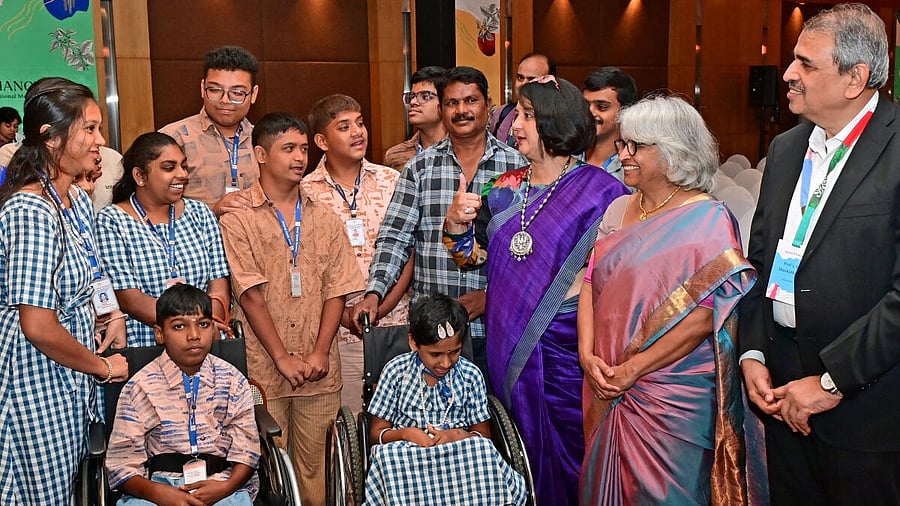
Caption: Rohini Nilekani, Philanthropist, Prathima Murthy, Director NIMHANS and Dr LS Shashidhara, Director NCBS with kids from Srishti Special Academy.Credit: Special arrangement
Bengaluru: From discussing maternal mental health to the connection between gut and brain, the first day of Manotsava, National Mental Health Festival 2025 kicked started with discussions about various aspects of mental health.
The second edition of Manotsava event is co-hosted by Rohini Nilekani Philanthropies Foundation (RNPF), National Institute of Mental Health and Neuro Sciences (NIMHANS), and National Centre for Biological Sciences (NCBS).
Rohini Nilekani, Philanthropist, said, “The Festival is about breaking silences, being able to communicate, acceptance and being able to celebrate it.”
The discussion on maternal health revolved around the difficulties of the new mom, the expectations of the society and role of families.
Panelist Dr Prabha Chandra, Professor and Head of Psychiatry, NIMHANS, spoke about the changes and fine tuning of the mother’s brain during pregnancy and post pregnancy. “Just like during adolescence, martescence takes place during the postpartum period, where the mother can only think about the protection and importance of the child leading to her missing out on a lot of other aspects.”
The doctor also highlighted the absence of mental care for women who have suffered stillbirth and pregnancy losses. “In Africa, there is a community called Still A Mother to support women who have lost their babies but that kind of support is lacking in our country,” said Dr Prabha Chandra.
She also said that the Prime Minister Office has requested to develop plans for virtual intervention for rural pregnant women to help them with pregnancy and postpartum period.
Poornima Mahindru, a clinical psychologist, said that the judgemental treatment towards women begins from conception, the kind of birth she gave and if she chose or were able to breast feed the child. “Sometimes no matter how much one tries, a woman will not be able to deliver or breastfeed the baby, but it is just because of medical conditions and does not have to do with whether one is a good mother or not. Such judgments add a lot of pressure on postpartum mothers,” said Dr Poornima.
Professor Richie Davidson from University of Wisconsin-Madison delivered the keynote address on the impact of screen time and lack of socialisation on humanity.
In the Indian context, a cross sectional study of Mental Health Effects of Excessive Screen Time and Social Media Use among Indian Adolescents and Young Adults it was found that 33.3% of people who scroll extensively presented depression, 43.7% presented with high stress and 25.3% with low self esteem issues.
A vital conversation on the systemic challenges facing the LGBTQ+ community in accessing affirming mental healthcare stressed that the progress in the queer community is a result of community activism and not spontaneous system change.
Sadam Hanjabam a queer activist’s organisation, has successfully used football as a medium to create safe spaces for young people, moving mental health discussions from clinics to playgrounds. "Therapy can be received from anywhere," he asserted, advocating for the community to become the "chosen therapist" and for sensitisation efforts to happen outside the community in schools, hospitals, and amongst grassroots workers like ASHA workers.
Another panel on the Gut-Brain connect discussed the effect of the daily food choice on gut microbiome and the importance of prebiotics, postbiotics and probiotics.
The panelists stressed on the necessity for region specific studies to understand relationships between gut and brain.